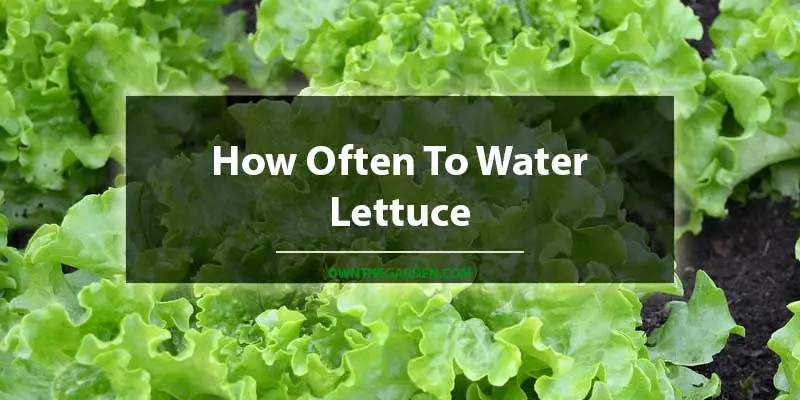Lettuce is a leafy green vegetable that’s easy to grow in your home garden. You can harvest it at just about any stage of growth, which makes it a versatile addition to salads and sandwiches. The most important thing to remember when growing lettuce is how often you need to water it. Lettuce needs regular watering, but not too much!
In this article, we’ll go over everything you need to know about keeping your lettuce happy and healthy with proper watering techniques and best practices for ensuring optimal soil moisture levels.
How Often To Water Lettuce
How often you should water lettuce depends on a few factors, including the type of lettuce, soil, and weather conditions. Lettuce needs to be watered every 4 to 5 days during hot weather (humidity greater than 70%).
While it’s important that your lettuces get their daily dose of water, you don’t want them to get too much. If there is a lot of rain in an area where you are growing lettuce, then the soil may become too saturated for the roots to take up nutrients efficiently.
A good rule of thumb is that if your plants wilt slightly during the day but recover at night, they are getting enough water. If they fail to recover or if they look wilted even at night then it’s time for more frequent watering!
What Is The Best Time Of The Day To Water Lettuce?
You can water your lettuce at any time of day, but the afternoon is the best. When you water in the morning or evening, it’s best to do so after the leaves have had a few hours to dry out. Once they’re dry and exposed to light and air, they’ll be more able to cope with moisture than if they were still wet from watering earlier.
If you choose to water in the morning, wait until after sunrise as sunlight will evaporate moisture from leaves faster than regular humidity levels would allow them to dry naturally.
How Much Water Does Lettuce Need?
Lettuce isn’t a high-maintenance plant, but it does require regular watering and some attention. The amount of water lettuce needs depends on the type you’re growing and the soil as well as weather conditions. You should give your lettuce plants around 1 to 2 inches of water per week during their growing season, which usually springs through fall.
How To Tell When Your Lettuce Needs Water
Lettuce is a great vegetable to grow at home, especially if you’re a beginner gardener. It’s easy to care for and can be grown year-round in many parts of the world. But even if your lettuce has been thriving, it may still need water from time to time.
Here are some signs that you should check on your lettuce:
- The leaves turn yellow or brown
- The leaves start curling up
- The stem at the base of the plant turns brown, wilting, or shriveling up
How to Water Lettuce
There are several methods of watering lettuce, but the most common is to use a hose. Watering with a hose is great for hardy plants like iceberg and romaine because they can tolerate being watered daily. If you are growing these varieties, make sure not to miss a single day of watering.
Drip irrigation is another way to water your lettuce plants in an efficient manner without wasting any water. Drip systems deliver water directly onto the soil so there are no runoff or evaporation issues as there would be with sprinklers or overhead irrigation systems.
How Long Can Lettuce Go Without Being Watered?
Lettuce is a cool-weather crop and it needs to be watered at least once a week, but more often if the weather is hot or dry.
If you’re growing lettuce in containers, make sure you check your local water restrictions for watering times. These will vary based on where you live and how much water is available locally.
If you are growing in an area with a lot of rainfall, then there’s no need to worry about watering lettuce since it can last a long time without being watered. In fact, many varieties of lettuce can survive for up to one week without being watered!
Conclusion
We hope this article has helped you understand how to water lettuce. Remember that it is important to water your plants regularly, but also not too much. Too much water can cause root rot and other problems, so make sure that if you do need an extra drink of water for your garden that’s what it is!


